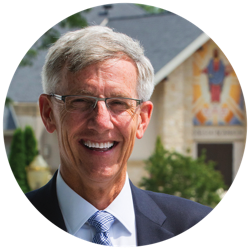As you reflect upon the Catholic colleges and universities you are considering, my Collins College Report Card tool offers my ACE framework for your use during the search process: Alignment, Culture, and Engagement with the Christian tradition. The framework is intended to help you identify and prioritize what you can observe as factoids that will be critical to the final institutional selection. This posting offers you an expanded definition of what I mean by “engagement” within the Alignment-Culture-Engagement framework.
Expectations matter. Are you looking for a chicken sandwich if you stop into Chick-Fil-A? Would you drive your car to your local Exxon station for gas or for a video game? Would you go to the bowling alley expecting to play golf?
Just like these examples, the research shows that college students attending a Catholic college or university actually expect to encounter Catholicism. Usually, this is a positive expectation. As we have seen recently, however, a Catholic university was taken to court by students of a different faith tradition for displaying Catholic art on campus. The institution fought back…and won.
The earliest form of education served to introduce the youth to culture— a group’s particular customs, values, and practices. The founder of the Catholic Church, Jesus Christ, was a teacher. His Church was established to hand on the faith—to educate others in the “Good News.” The 12 Apostles were sent forth to teach, preach, and institute a new culture that Christianity brought to the world. During the early Middle Ages, education took on a new form of transmitting knowledge in the shape of schools. The forerunners of the earliest European universities were the monastic schools— taught by Catholic monks and nuns, dating back to the 6th century. Between A.D. 1088- 1209 the schools at Bologna, Paris, Oxford, and Cambridge were established—and all of these were originally Catholic. These universities served as the archetypes of the American Catholic colleges and universities. Thus, for over 2,000 years, the Catholic Church has educated teachers and supported learning in its various forms—all sharing this Christian intellectual heritage. For the Christian, the path to discovering truth—and the unity of truth—leads to the awareness of a transcendent Other.
Today, the intellectual heritage preserved, generated, and transmitted by the Catholic Church over the course of history is shared with a new generation during formal education. The Catholic Church’s understanding of schooling is that teaching and learning emanate from both the natural order of the world and the divine revelations of God. A catholic college or university sustains the centuries-old and unbroken conviction expressed by St Augustine of Hippo, “Intellege ut credas; crede ut intellegas” (“Understand in order to believe, believe in order to understand”). The conviction that faith and reason are both present and necessary in order for individuals to gain the knowledge and wisdom that moves them closer to the truth is foundational to Catholic education. Thus, there remains an expectation that higher education would move beyond the intellectual and include development of the soul. Both expectation and anticipation for this encounter with the secular and sacred emerges from my research.
For most of America, the Catholic colleges and universities were founded by the various religious orders. Today’s approach to education at many of these schools flows from and extends the heritage of the religious order that has maintained sponsorship since the school was established. For many, it has been their belief that people are better able to serve God and their neighbors if they are educated in the pursuit of Truth.
The students immersed in this Catholic culture have been encouraged to perform activities that seek to have a positive impact on others and to promote peace. Social justice, therefore, continues to be a cornerstone in a way of life for those educated in a Catholic environment, as it has for nearly 900 years. A strong heritage, with its unbroken emphasis on study in the Catholic intellectual tradition, is a significant factor in a college education.
Thus, when you are looking at a Catholic college or university you ought to be able to find a clear line of demarcation with the secular colleges and universities. It is likely you will find alignment within a public system of higher education to some higher authority, such as the State government for a public school. On any given college campus, one is likely to find more than one culture active and present—and one of them may be a Catholic subculture. However, for a religious-affiliated college or university encountering an institutional engagement with the Christian tradition is the distinguishing feature. Further, it is encountering this institutional engagement in combination with a culture that seeks alignment with the Roman Catholic Church that is most distinctive.
You can “see” this aspect of the framework in the overwhelming prevalence of Christian thinking and behavior in all campus affairs. From your initial contact, you should sense that the environment is distinctly different. The school’s relationship with the Catholic Church is neither hidden nor avoided, and the Catholic culture is not just present but it is dominant. Religious conversations, of any faith, are encouraged. Academic freedom will demand that the Catholic point of view is offered along side of other views—it is not ignored. Discovering a life’s purpose is an aspect of the journey not to be overlooked. For 2,000 years the Christian tradition has challenged mankind to think and act differently. The best exhibit of the application of this final theme is a campus lifestyle that thrives on being distinctive from the perspective of the Christian tradition.
There are plenty of other examples…to which I summarize as the last 5 of the 15 signal features (Religious Presence of Views during Institutional Inquiry) that emerged from my research and are in the Collins College Report Card. These are the “street signs” that point to a school that expects the community to be engaged with Christian traditions as a particular way of life.
With “alignment” we concluded by noting the school needs to “walk the talk.” The “culture” is the glue-ware that creates an environment that encourages scholarship while affirming discipleship…modeling the way for the community. The “engagement with the Christian tradition” is the singularly distinctive difference from any other school—public or private—that ensures the experience will make you a better person as it prepares you for your life’s work.
If you are looking for a chicken sandwich—Chick-Fil-A works. Head to Exxon to put gas in the car. If you are looking for an education that will support your intellectual and spiritual development…then look for this “engagement” to ‘come to life’ on the website, on the campus, and in the members of the community with whom you interact.

